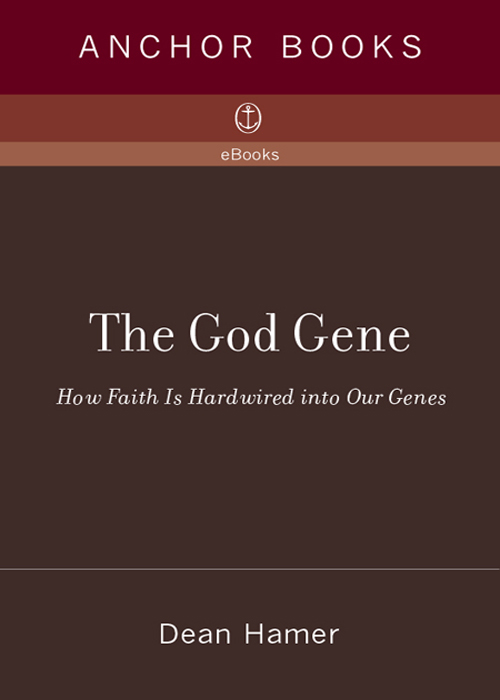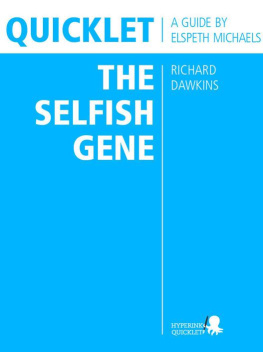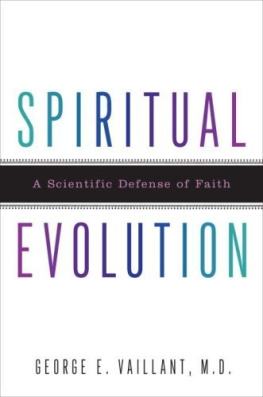

Contents
To Donald and David,
my spiritual guides
Acknowledgments
R eligion and spirituality are topics far removed from my professional expertise in molecular genetics. Without the help and encouragement of friends and colleagues from many disciplines, I could never have written this book.
I owe special thanks to Ronald Green, professor of religion and chair of the Ethics Institute at Dartmouth University, who early on helped me focus on the personal aspects of religion. Ron steered me to the right questions, even though he still fundamentally disagrees with my answers. Gerald Edelman, the Nobel laureate biologist who now directs the San Diego Neuroscience Institute, is another skeptic who nevertheless provided me with deep insights into the brain and consciousness.
Robert Cloninger, a physician-scientist who is professor of psychiatry, genetics, and psychology at Washington University School of Medicine in St. Louis, played an important role in convincing me that spirituality is a measurable quantity. His self-transcendence scale is central to the book, and I have always profited by our interactions.
Lindon Eaves, who is both a professor of human genetics and psychiatry at Virginia Commonwealth University and an Anglican priest, provided much insight and knowledge about how spiritual and religious values are transmitted. I thank Susan Blackmore, a senior lecturer in psychology at the University of the West of England, Bristol, for being so unselfish in communicating her insights into memes. Lee Dugatkin, associate professor in the Department of Biology at University of Louisville, Kentucky, and author of several books about animal behavior, greatly impacted my thinking about evolution and group selection.
Both Andrew Newberg, director of nuclear medicine at the Hospital of the University of Pennsylvania, and V. S. Ramachandran, who is director of the Center for Brain and Cognition at the University of California, San Diego, and adjunct professor of biology at the Salk Institute, provided insight into the ingenious neurobiological methods they have developed to probe the role of the brain in spirituality and belief. On the molecular side, George Uhl at the National Institute on Drug Abuse was kind enough to share with me his vast knowledge of monoamine transporters and their genes, including VMAT2.
The chapter on the DNA of the Jews could not have been written without the help of David Goldman and Neil Bradman in London, England, and Karl Skorocki in Haifa, Israel, who were kind enough to spend time with me explaining both the science and the fascinating personal stories behind their research. Also in Israel, Bob Belmaker, Jon Benjamin, and Dick Ebstein provided both sage advice on psychiatric genetics and a guided tour of the multicultural synagogues of Beersheba.
I learned much about witchcraft and the religious construction of gender from my cousin Wendy Griffin, professor of womens studies at California State University, Long Beach. Through Wendy, I met the formidable high priestess and teacher of the Wiccan way, Vivianne Crowley, who lectures and writes about paganism in England.
I had the great fortune to meet James Austen, author of Zen and the Brain, at a conference in Kyoto, where he provided sage advice on both the neurobiology and the practice of Zen Buddhism. It was during the same trip that I visited the Hosenji Zen Center, where Tenkai and several monks were kind enough to discuss their own unique insights into Zen.
Julie Castiglia, my agent, and Roger Scholl, my editor, were instrumental in convincing me that people might actually read a book that mixed the seemingly incompatible topics of religion and science. I thank them for their guidance, patience, and formidable editing skills.
I owe thanks to several organizations and institutions as well as individuals. The Templeton Foundation is a terrific source for information about religion and science through their Web site, newsletters, and sponsored lecture series. The Zygon Center for Religion and Science publishes Zygon, the premier academic journal on religion and science, while Science and Spirit Resources publishes the accessible periodical Science and Spirit.
For the past twenty-eight years, the National Institutes of Health has provided me with a superb research environment and many talented colleagues. I would like to emphasize, however, that this book was written strictly as an outside activity with no financial support or institutional encouragement from the United States government. The ideas expressed here are solely my own.
My greatest inspiration was William James, whose Varieties of Religious Experience has provoked my thinking about the role of biology in culture ever since I first read it for a psychology course as an undergraduate. His belief that there is a fundamental divide between private and public religion is central to my thinking. Although James lived long before genes and DNA were discovered, I like to think that he would fundamentally agree with the thesis of The God Gene.
Lastly, I thank my partner, Joe Wilson, and my spiritual guides, Donald and David, for standing by me through thick and thin.
One
Spiritual Instinct
Instinct leads, logic does but follow.
William James
T he first thing I noticed about Tenkai was his smile. It was serene, content, knowing but not smug. It was the smile of a person at peace with himself and the world around him. The smile of someone who had seen much but could still be surprised. It was a spiritual smile.
The second thing I noticed was that even though Tenkai spoke fluent Japanese, wore traditional Japanese garb, and was living in a Japanese monastery, he was clearly not Asian. His blue eyes and light brown hair were the giveaway. He, in fact, was born and raised in Hamburg, Germany, as Michael Hoffman.
I met Tenkai at the Hosenji Zen Center, which is located in a small Japanese village about an hours train ride west of Kyoto. The Center provides a venue for people from different countries and religious traditions to learn about Zen Buddhism and practice its system of meditation, known as zazen, in which one sits in the lotus position with half-closed eyes and focuses on breathing. The idea is to empty the mind of all thoughts.
I participated in the Centers daily activities: waking to a gong at 6 A.M., an hour of zazen sitting in a traditional tatami mat room overlooking a waterfall, eating a breakfast of rice gruel and pickled vegetables in silence, several hours of weeding the vegetable garden or sweeping the stone paths, sutra chanting, supper of more rice and vegetables, and a final two hours of meditation in a log cabin overlooking a temple. It was a peaceful life. But I was not at the Center to ripen my intuitive faculties or to experiment with monastic existence. I was there attempting to understand whether or not there is a biological basis of spirituality.
Until the age of twenty-four, Tenkai led an ordinary life as a high school teacher. Following a breakup with his girlfriend, however, he began to ask himself the life questions at the heart of our need to believe in something larger than ourselves. Why was he here? What is the purpose of life? Why is there so much suffering? Soon thereafter he quit his job, got on his bicycle, and started pedaling east. He didnt stop until he reached the shores of the East China Sea.
Next page








